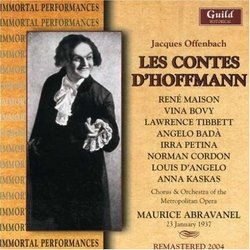| All Artists: Jacques Offenbach, Abravanel, Maison, Bovy, Tibbett Title: Offenbach: The Tales Of Hoffmann Members Wishing: 0 Total Copies: 0 Label: Guild Original Release Date: 1/1/2005 Re-Release Date: 1/17/2005 Album Type: Import Genre: Classical Style: Number of Discs: 2 SwapaCD Credits: 2 UPC: 795754231625 |
Search - Jacques Offenbach, Abravanel, Maison :: Offenbach: The Tales Of Hoffmann
 | Jacques Offenbach, Abravanel, Maison Offenbach: The Tales Of Hoffmann Genre: Classical
|
Larger Image |
CD DetailsSimilar CDs |
CD ReviewsALAS MY HEART DAVID BRYSON | Glossop Derbyshire England | 01/19/2009 (4 out of 5 stars) "Helas, mon coeur, indeed. I love Offenbach, I adore The Tales of Hoffmann in particular, I am extremely enthusiastic about this set of it, but I had better start by explaining about the recording. This is a broadcast of a live performance at the Met in 1937. It has been remastered in 2004 (on 2 discs, not 1 - look at the picture), and for all the undoubted remaining deficiencies I would guess that the remastering has been done extremely well. I would even suspect that the original recorded quality may have been very good for its time - the sound is far better than was given to Toscanini on many of his postwar records in the appalling Studio 8-H, to an extent that is probably beyond the capacity of the most skilful remastering.
The main defect is one that I personally find quite easy to ignore. You will find it on the first disc tracks 4-6, 10-11, 15 and 18-20; and on the second disc track 8. It is some kind of extraneous foreground noise, occasionally suggestive of a tape being rewound, but after coming to my second hearing of the set prepared for what I was going to hear I was already beginning to discount it. I'd hope that if you think of it as you would think of a bit of static or other interference in a radio broadcast it will quickly become unimportant to you so that you can get on with appreciating a performance that has a great deal going for it indeed. The particular virtues, and the exceptional historical interest, of the set are described quite admirably in the liner note by London Green. This note is not unduly long, but for intelligence, insight, sympathy and clarity it is one of the best I have ever seen. Assuming that London Green is a person, I shall refer to 'him'. He highlights for special mention the tenor Rene Maison in the part of Hoffmann himself, and for the right reasons. French heroic tenors are a rare breed nowadays for one thing, but a French heroic tenor is exactly who is needed to sing the part of Hoffmann. It would be absurd to sing Offenbach as if he were Wagner or Verdi, but a much more important trap to avoid is to let Hoffmann sound pathetic or ridiculous. He is not just an individual, he is an embodied set of situations, and he is also the central figure in a coherent series of modern fairy-tales. Under no circumstances should Hoffmann lose his stature or importance so that he dwindles into a peg in the narrative on which three or maybe four separate stories or episodes are hung; but if the tenor has too small a voice, or the wrong type of voice, that is exactly what tends to happen. Next in importance is Vina Bovy who has to take all four of the main female roles. London Green praises in particular Bovy's performance as Olympia, and I join him in that. However I would say, at least at this early stage in my acquaintance with the set, that she does all four very well. Perhaps Tibbett in four baritone parts and Irra Petina as Nicklausse deserve some slight reservations that London Green expresses, but for me the sheer pace and panache of the entire account leave me unwilling to find faults. Obviously the conductor has to get most of the credit for that, and in addition to his main commentary London Green supplies us with brief biographical notes on both Maurice Abravanel and the vocal principals. What seems to me important about this set is that it reveals the real significance of this 'light' opera. I confess that all my life I have found Gilbert and Sullivan tiresome. This no doubt partly because of the kind of G & S enthusiasts that it has been my lot to encounter, but it also speaks of a slight antipathy to the flip and slightly cheap William Schwenk Gilbert. Offenbach is no doubt very sophistique and smart too, but there is real pathos and human sympathy in 'Hoffmann' whose hero's story is characterised by Beecham as 'tragic'. There is also the gorgeous tune of the Barcarolle, as beautiful yet as when I first knew it 60 years ago, dominating the second disc and the denouement of the entire work. 'Pardieu' I say, 'Morbleu' and words to that effect. I suppose that if good modern sound is an intransigent requirement from you then this 1937 recording may not come up to scratch. However if any story ever underlined the danger of falling for beauty of a mechanical nature, surely it is this one. The set includes a broadcast commentary in the refined tones of Milton Cross, and obviously applause is all part of the offering. All well and good so far as I am concerned, not least in bringing the playing time of the second disc to 80 minutes and thus adding value in terms of quantity. The full libretto is not provided, but as an excellent substitute there is a detailed summary of each track. Let me therefore add my own applause." |

 Track Listings (45) - Disc #1
Track Listings (45) - Disc #1